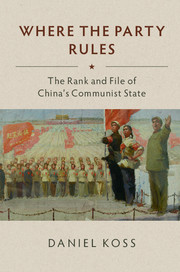Book contents
- Frontmatter
- Contents
- List of Figures
- List of Tables
- Acknowledgments
- PART I AUTOCRATIC GRASSROOTS POLITICS
- PART II THE PARTY IN CONTEMPORARY CHINA
- PART III THE PARTY'S ORIGINS
- 5 War Contingencies at the Origin of the CCP's Power Base
- 6 The Shifting Geography of the CCP's Power Base (1949–2016)
- PART IV THE PARTY IN THE MAO ERA
- Appendix 1 Party-versus-Bureaucracy Model
- Appendix 2 Party Growth Model
- Notes
- Primary Material
- Secondary Sources
- Index
5 - War Contingencies at the Origin of the CCP's Power Base
from PART III - THE PARTY'S ORIGINS
Published online by Cambridge University Press: 21 April 2018
- Frontmatter
- Contents
- List of Figures
- List of Tables
- Acknowledgments
- PART I AUTOCRATIC GRASSROOTS POLITICS
- PART II THE PARTY IN CONTEMPORARY CHINA
- PART III THE PARTY'S ORIGINS
- 5 War Contingencies at the Origin of the CCP's Power Base
- 6 The Shifting Geography of the CCP's Power Base (1949–2016)
- PART IV THE PARTY IN THE MAO ERA
- Appendix 1 Party-versus-Bureaucracy Model
- Appendix 2 Party Growth Model
- Notes
- Primary Material
- Secondary Sources
- Index
Summary
If it wasn't for your Imperial Army invading most of China, the Chinese people could not have united to deal with you and the CCP would not have been able to seize power.
Mao ZedongHaving demonstrated in the previous two chapters that the party's penetration of local communities is extremely consequential, this chapter turns to history in order to explore why the party is so much more present in some localities than in others to begin with. Founded in 1921, the CCP was on the run for the first decade and a half of its existence. After the party's near-defeat in Southern China and the Long March, the survivors took refuge in a remote mountain area known as the Yan'an base area, with few prospects of future success. Yet the fate of the party was to change dramatically, because the outbreak of the Sino-Japanese War in 1937 granted the CCP a second chance. The enemy not only shielded the party from persecution by the incumbent government, which under the circumstances had little choice but to agree to a united front. In addition, the foreign aggression facilitated recruitment among civilians most affected by the war. Behind Japanese enemy lines, Communists set up local party branches and even full-fledged governments. Many of these institutions would be kept intact until the foundation of the People's Republic. This chapter explains how the geographic patterns of Japanese occupation shaped the party's rank-and-file power base until the eve of the Communist takeover in 1949. That these early membership patterns persisted even after 1949 and are still reflected in the party's power base today is demonstrated by the following Chapter 6.
As reflected in the epigraph, Mao Zedong recognized that the Japanese invasion provided the CCP with a golden opportunity for mobilizing the masses and for reviving the Communist movement.
- Type
- Chapter
- Information
- Where the Party RulesThe Rank and File of China's Communist State, pp. 161 - 192Publisher: Cambridge University PressPrint publication year: 2018



